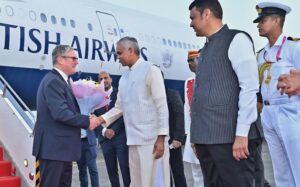By: Engineer Bakht Said Yousafzai
UK Prime Minister Keir Starmer has drawn a clear boundary ahead of his trade mission to India, declaring that his government will not relax visa rules for Indian nationals. While the visit aims to strengthen economic and strategic ties, Starmer made it clear that migration will not feature in trade discussions. His statement highlights a deliberate separation between economic policy and immigration politics, reflecting a firm approach to border control.
Starmer stressed that the UK, India free trade agreement will focus solely on trade, investment, and innovation, not immigration. He made it clear that this partnership is about mutual growth rather than expanding visa opportunities. The message is aimed at managing expectations at home and reaffirming that immigration policy remains driven by domestic priorities, not external pressure.
The announcement comes amid pressure from business and academic sectors urging easier access for Indian professionals and students. Many believe relaxed visa rules would address skill shortages and boost innovation. Starmer disagrees, insisting Britain must invest in training and productivity rather than relying on imported labour.
This position fits Labour’s broader goal of reducing net migration, a politically sensitive issue in Britain. Starmer has promised to combine economic openness with control, a balance that previous governments often failed to achieve. By refusing concessions, he aims to show consistency and maintain public confidence in the immigration system.
Starmer’s message was measured but firm. Britain will continue to welcome top global talent, but entry will remain selective, merit-based, and tied to national economic needs. His policy represents “controlled openness,” recognising the value of global cooperation while protecting sovereignty. This balanced stance defines his style of diplomacy, where realism outweighs sentiment.
Critics warn the hard line could harm long-term interests. India is a major source of skilled workers and entrepreneurs, and restrictions may limit innovation and partnership opportunities.
In India, reactions are expected to be mixed. Some may see the move as a diplomatic slight during a major trade visit, while others accept that immigration is a sovereign matter. Despite disappointment among students and professionals, cooperation in trade and education remains valued.
Supporters argue that separating migration from trade is practical, keeping negotiations focused on tangible economic results such as market access, investment, and technology exchange. By avoiding political distractions, both countries can concentrate on growth and innovation.
India already ranks among the top sources of skilled and student visas to the UK. Starmer’s government plans to maintain this level, not expand it, focusing on efficiency and fairness. He praised India’s cooperation on return and readmission agreements, describing it as vital for responsible migration management.
As Starmer meets Indian leaders in Mumbai, both sides must balance ambition with restraint. Britain aims to show discipline without appearing closed, while India seeks stronger trade and strategic ties. Despite differing views on visas, collaboration in defence, energy, and education continues to grow.
Starmer’s firm stance reflects a calculated, disciplined approach to diplomacy. By drawing a clear line between migration and trade, he signals that Britain’s partnership with India will rest on strategy, not compromise. The message from Downing Street is direct: the UK welcomes trade, talent, and investment, but visa rules will remain measured, merit-based, and firmly under British control.




